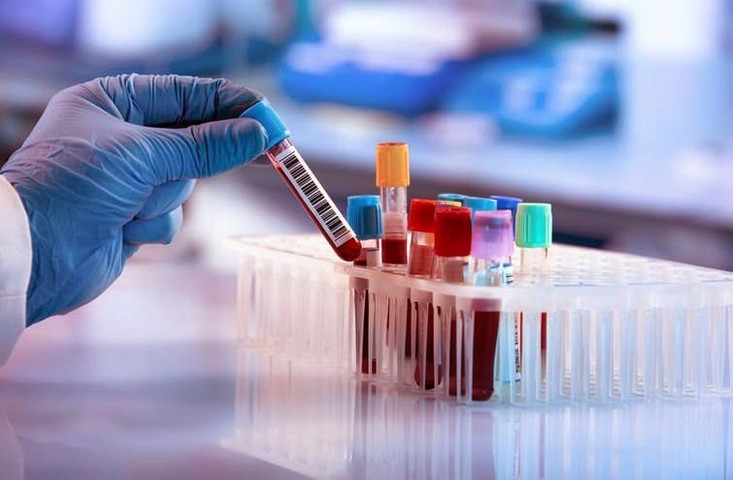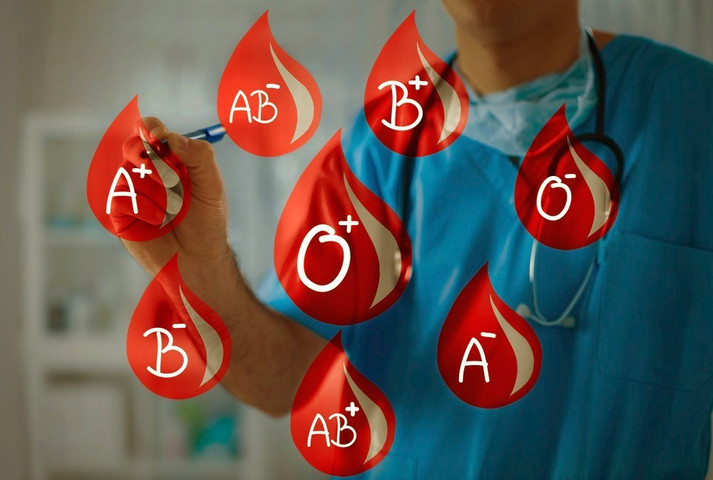 ABO System is further distinguished by the Rh factors. These are the protein in the blood that shows whether the blood group is Rh-positive or Rh-negative. If a person’s blood carries the Rh-factor then the blood type of the person is positive or if not present then the blood type of the person will be negative. For example, if a person has the blood O with Rh factor then the individual blood type will be O+. Additionally, the RhD antigen is checked in the ABO system. If the RhD antigen is present then the blood type is RH-positive and if not present then the blood type is Rh-negative which means it lacks the only RhD antigen.
According to the Stanford School of Medical Blood center, the blood group of an individual varies geographically. Like in the United States, the blood group
ABO System is further distinguished by the Rh factors. These are the protein in the blood that shows whether the blood group is Rh-positive or Rh-negative. If a person’s blood carries the Rh-factor then the blood type of the person is positive or if not present then the blood type of the person will be negative. For example, if a person has the blood O with Rh factor then the individual blood type will be O+. Additionally, the RhD antigen is checked in the ABO system. If the RhD antigen is present then the blood type is RH-positive and if not present then the blood type is Rh-negative which means it lacks the only RhD antigen.
According to the Stanford School of Medical Blood center, the blood group of an individual varies geographically. Like in the United States, the blood groupAB- is of the rarest type. While globally, blood type B is considered the least common blood group and the O blood group is considered the most common blood group in the individuals, and O- is known as the universal blood group. Despite being rare and having fewer donors but still, AB- blood group demand is not that much. According to the American Red Cross, rare blood type is present in less than 1/1000 people. Rh null is the rarest blood type that is only reported in 1 of the 6 million individuals. In this, the individual blood cells lack Rh-protein because of the absence of Rh antigens. Aboriginal Australians was the first person whose blood group was reported as the Rh null. The person found with this blood group is very high risk because they rely on the people who had the same blood type. Globally, only 9 active donors are there for this rarest blood group type in the world. This rarest blood type was given the name golden blood type. It’s very difficult and sometimes impossible to deal with the health issues of such a person when it comes to blood transfusion or transplant of an organ. Expectant women with Rh null blood group may endure the complications of blood compatibility with the fetus. One of the Iranian pregnant women experienced several pregnancy losses because of having the blood group Rh null. Normal Vs RHnull RBCs:
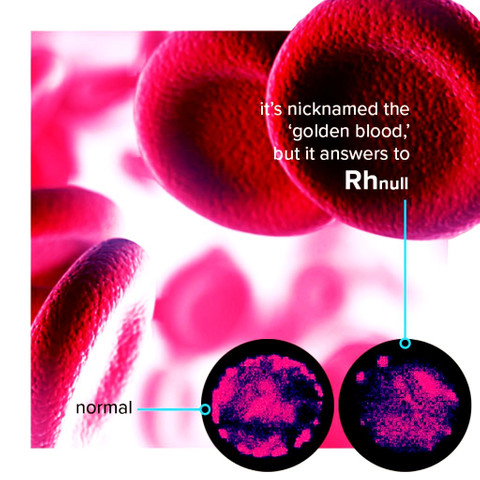 RHnull: Rarest Blood Group on Earth
RHnull: Rarest Blood Group on Earth
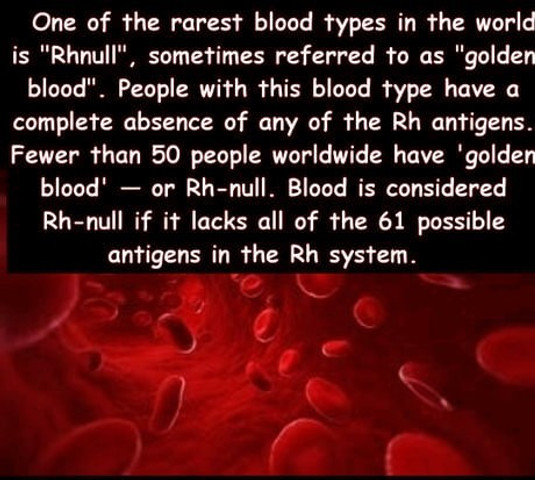
Why do people have this rarest blood group(golden blood)? This rarest blood group in rare people is due to the spontaneous change in their gene which is known as a genetic mutation. RHAG gene is commonly seen with a genetic mutation that is responsible for the coding of Rh-associated glycoprotein. The mutation of this gene disturbs its functionality and miscodes them. These proteins are necessary for the direction of Rh antigens to the RBCs
membrane.Hereditary stomatocytosis is the disease caused by the RHAG mutation in which the red blood cell membrane is destructed and broken down. The conditions that may put you at the risk of the rare blood group complications are;
- Autosomal genes
- Alteration or complete removal of certain genes
- Consanguineous marriages
- Hemolytic Anemia
- Blood transfusion complications
- Pregnancy Incompatibility
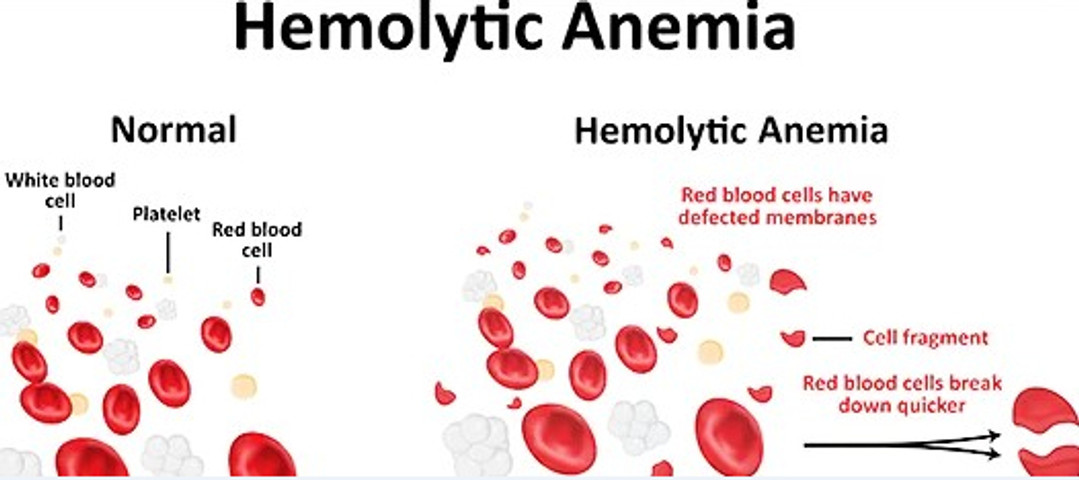 Blood transfusion complications:
Blood transfusion from one person to another is done after blood typing. The blood groups are specified according to which a certain blood group of one person can be donated or transfused to the other person’s blood with certain blood group type compatibility. The individual can face serious issues if the wrong blood type is injected into their blood without blood typing. Similarly, the blood transfusion of the individual with Rh null is much more challenging than the other individuals whose blood type falls in one of the ABO systems. If their blood is mistakenly exposed to their Rh antigens from the other person’s blood then they can have a severe blood transfusion reaction.
Pregnancy Incompatibility:
Pregnant women with this rarest blood type pass through many serious health issues and complications. For example, If a mother is having this golden blood group and the child is having a blood group with Rh-positive can experience serious issues. If the mother’s blood gets sensitized by the baby's blood then for its defense the mother's blood will produce antibodies which in turn results in the target of future pregnancies, abortion, or miscarriages.
Can Rhnull blood group be donated?
Yes, this golden blood group can be donated and it is considered the best for the blood transfusion. It is deemed risk-free for blood transfusion because of the absence of the antigen on the RBCs. Its donor is known to be the universal donor because they lack all of the antigens in the Rh system. But unfortunately, it is not good for the people who had this golden blood group because it's very difficult to find a donor for them. Only 9 active Rhnull donors are present across the world.
Where do donations of rare blood come from?
Usually,the blood donation of golden blood is of three types which are;
Blood transfusion complications:
Blood transfusion from one person to another is done after blood typing. The blood groups are specified according to which a certain blood group of one person can be donated or transfused to the other person’s blood with certain blood group type compatibility. The individual can face serious issues if the wrong blood type is injected into their blood without blood typing. Similarly, the blood transfusion of the individual with Rh null is much more challenging than the other individuals whose blood type falls in one of the ABO systems. If their blood is mistakenly exposed to their Rh antigens from the other person’s blood then they can have a severe blood transfusion reaction.
Pregnancy Incompatibility:
Pregnant women with this rarest blood type pass through many serious health issues and complications. For example, If a mother is having this golden blood group and the child is having a blood group with Rh-positive can experience serious issues. If the mother’s blood gets sensitized by the baby's blood then for its defense the mother's blood will produce antibodies which in turn results in the target of future pregnancies, abortion, or miscarriages.
Can Rhnull blood group be donated?
Yes, this golden blood group can be donated and it is considered the best for the blood transfusion. It is deemed risk-free for blood transfusion because of the absence of the antigen on the RBCs. Its donor is known to be the universal donor because they lack all of the antigens in the Rh system. But unfortunately, it is not good for the people who had this golden blood group because it's very difficult to find a donor for them. Only 9 active Rhnull donors are present across the world.
Where do donations of rare blood come from?
Usually,the blood donation of golden blood is of three types which are;
- From routine donations doctors take fresh blood cells, this option is on priority.
- Secondly, the doctors contact the people who are having this rarest blood group and want to donate it. In return, these rarest donors are paid. About only 9 active donors are there in the world.
- Lastly, for the emergency cases, this rare blood is Freezed which can be preserved for 30 years
An individual having the rarest blood group can face, experience, and passes through serious challenges when it comes to health issues. The person who has the Rh null blood group which is given the term as golden group suffers more complications in life. This precious blood group is found in very rare people around the globe. People with the golden blood group can have serious complications, especially in blood transfusion and while doing a transplant of an organ because if they are exposed to the antigens of the other blood type
then it can cause serious transfusion reactions. Especially, pregnant women are at very high risk because of their rarest blood group. This blood group is precious for others to have the risk-free blood transfusion but not for the individual having it.
